Buncombe County, Asheville school speak out against voucher bill: 'It's a 'giveaway'
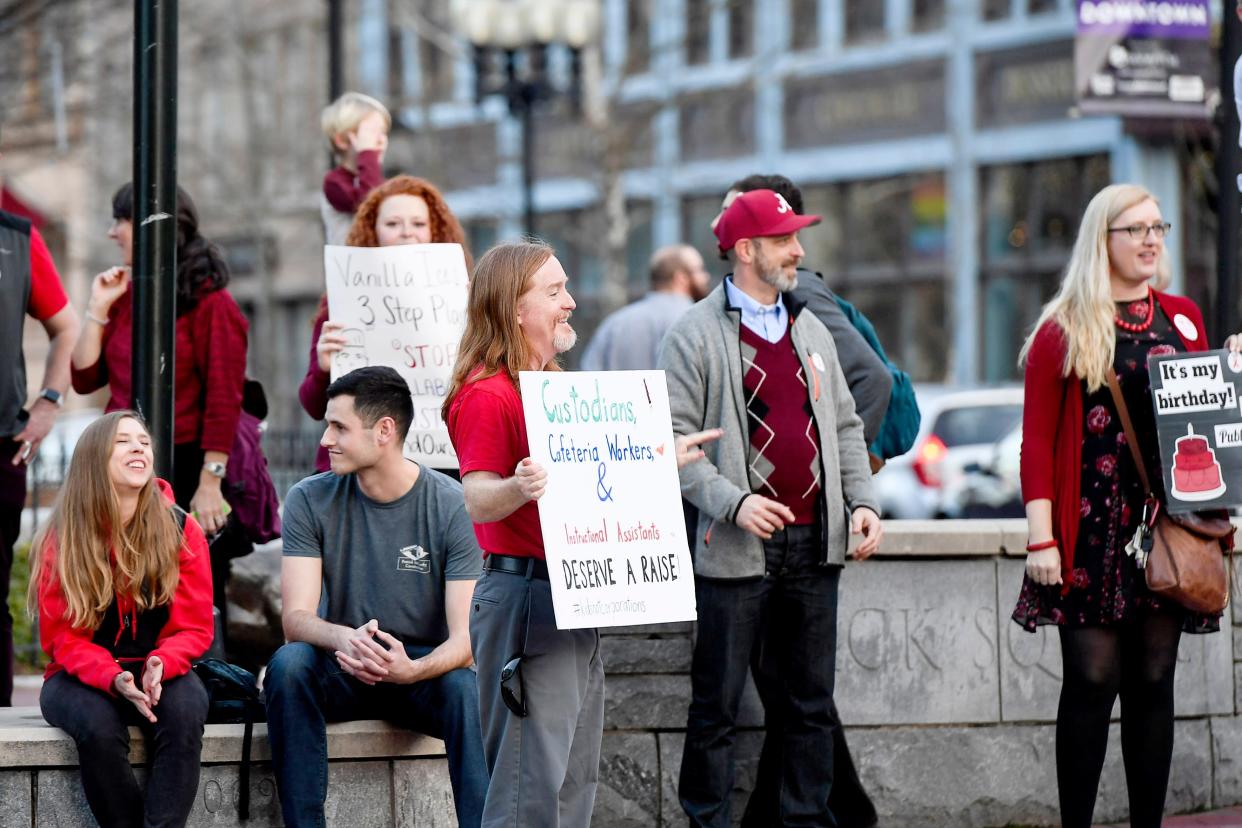
ASHEVILLE - As the private school voucher program has sparked controversy across North Carolina, private school attendance is up 10% compared to last year. Opposition to expand vouchers in the Opportunity Scholarship Program has grown since it was introduced this year, but will this be enough for the bill aiming to expand the program to be removed from the Senate's state budget proposal?
The Office of State Budget and Management technical analysis showed that the proposed voucher expansion would take around $200 million out of the public school system. This would result in sending more than a quarter of a billion dollars to private schools.
There are 37 private schools in Buncombe County with 4,173 students attending them, according to a 2022-23 report from the North Carolina Department of Administration for Non-Public Education.
There are 22,079 students who attend BCS, and 4,101 who attend Asheville City Schools.
In Buncombe County there were 699 recipients of the Opportunity Scholarship Program in 2022-23, according to the North Carolina State Education Assistant Authority — putting it in the top 10 counties of most recipients in the state. As of May there have been 490 new applicants in the county.
There are now 126,768 students attending private schools in North Carolina, according to a statewide report. The number of private schools in the state has almost doubled since the 1991-92 school year.
This number could keep growing if the voucher program becomes law in September, when the state budget is expected to pass.
Backers of the bill put the allocation of the money for the voucher program in the 2024 fiscal year budget as well as the policy change.
Where does the money go?
HB823 and SB406 both known as "Choose Your School, Choose Your Future" bills, would make “all N.C. K-12 students eligible for opportunity scholarships, with grant amounts based on household income, beginning in 2024-2025.”
According to the NCSEAA website an "Opportunity Scholarship is an income-based program for students who have previously attended public school and plan to attend a direct payment school for the 2023-24 school year."
Out of the 37 private schools in Buncombe County there are 23 listed as a direct payment school on the NCSEEA website.
One of the major changes to the Opportunity Scholarship Program is students are no longer required to have previously attended a public school to qualify for a voucher.
"That means if you're a rich kid who has been in private school forever, you can now get a voucher," Kristopher Nordstrom, a senior policy analyst with the Education and Law Project at the North Carolina Justice Center told the Citizen Times Aug. 11.
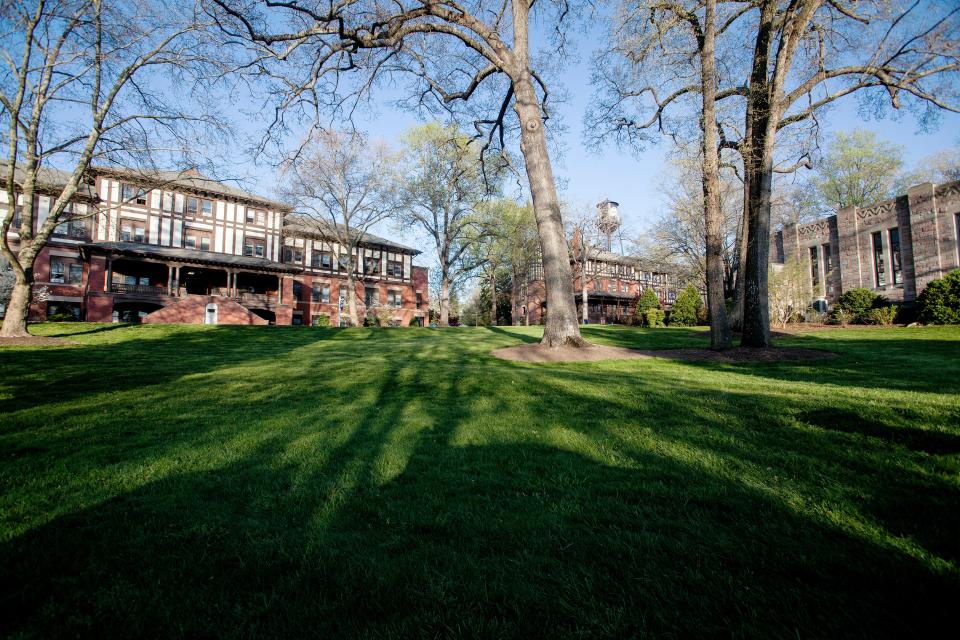
If the eligibility requirements were kept the same, there wouldn't be enough demand, according to Nordstrom.
Since 2015, 449 vouchers have been awarded to schools that failed to report their enrollment to the Department Non-Public Education in N.C., a report from Nordstrom said.
"We're looking at over 90% of the voucher money going to private religious schools, and a third of those teaching our children things that are in opposition to what we as a community have decided is important for our children to know to be active and engaged members of our society as they grow up," Lissa Pederson, vice president of the Buncombe County Association of Educators told the Citizen Times Aug. 11.
Out of the 126,768 students who attended private schools in the 2022-23 school year, about 68% of them attended religious schools, according to the report from the NCDOA.
The report states there are 319 independent schools, but the majority are religious schools, with 565 across the state.
Pederson is citing a study done from the Duke University law school between 2014-2020 that reveals the negative impacts vouchers can have on public schools — especially in regard to the lack of oversight on learning outcomes.
"The public has no information on whether the students with vouchers have made academic progress or have fallen behind," the study said.
A report released early this year showed an achievement gap where Black Buncombe County and Asheville City school students are significantly less likely to hit performance metrics and are more likely to be disciplined at school than their white peers.
A 'giveaway'
Shanna Peele, president of Buncombe County Association of Educators, is a mother of three children in the Asheville City Schools district and says that this bill is not about supporting working-class families.
"It's really about giving more money to people who already have the means to send their children to private schools," Peele told the Citizen Times.
"For me as a parent, it's going to create a more segregated school system. My children will have less opportunities in the public schools because of the money it's going to suck out of public schools."
As county and city schools struggle for funding, Chair of the Board of Education at Asheville City Schools, George Sieburg told the Citizen Times Aug. 11 that the ACS Board does not approve of this bill.
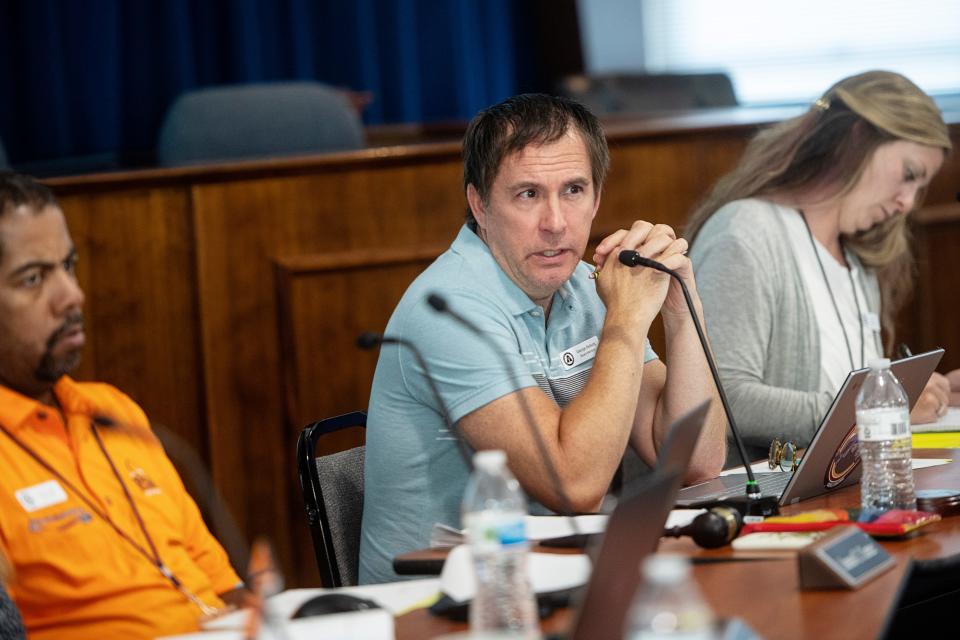
"It takes away much needed funds from public education. It puts it in the hands of schools that don't have the same kind of accountability that public schools do, and that creates a real equity issue," Sieburg said.
"We're putting taxpayer dollars into programs and schools that we don't have a lot of say on how they operate."
Democratic state Sen. Julie Mayfield, who represents Asheville, told the Citizen Times that the philosophy behind the bill is that state money should follow a child.
Mayfield explained that the GOP's reasoning is, "If the child goes to public school, the state allocation of funding for that child goes to the public school. But if the child goes to private school, that child is still entitled to state funding for their education."
Why would taxpayers have to pay for wealthy families to send their children to private school when they can already afford it, she asked.
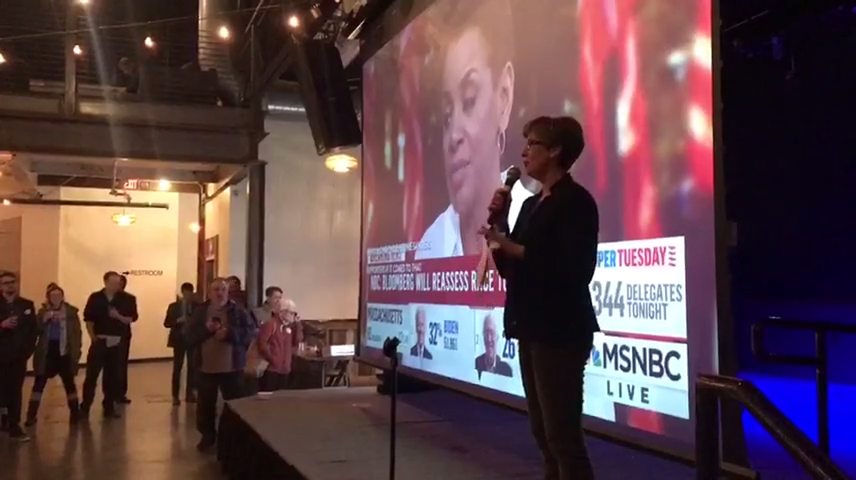
"This is an absolute giveaway. You could be a millionaire in our state, and you already send your kid to private school, then all you're doing is getting a tax break," Pederson said.
"You're getting money directly funded by our taxpayers, to give you something you're already doing."
The bigger conversation
At a June roundtable discussion in Asheville with Democratic Gov. Roy Cooper, the voucher bill was the main topic of conversation, as many are concerned what this will do for public school funding.
The state House and the Senate are pushing private school vouchers "on steroids," Cooper said.
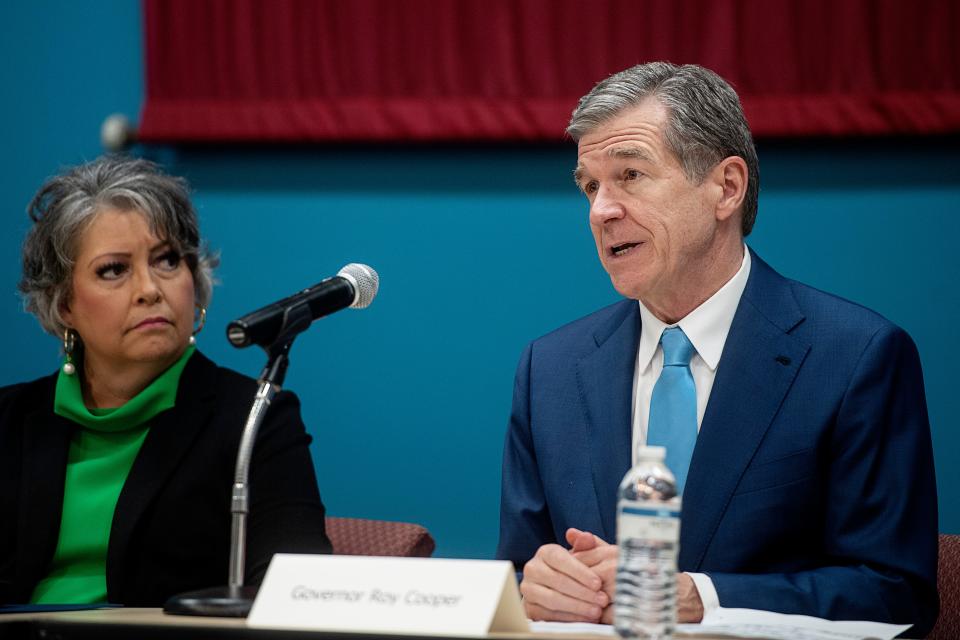
They have set aside billions of dollars to fund money into private schools — making it so that there's no income limit for people who could get these vouchers.
"With the Senate budget, a millionaire would be able to keep a child in a private school and get thousands of dollars from the state while a veteran teacher is going to get a $250 raise. That is the Senate's priority. The house is better, but it's not a whole lot better," he said.
Cooper told those at the roundtable that the legislature has received 36 resolutions from county boards across the state that are asking to protect public education — rural schools will be impacted the most.
County and city schools could lose over a combined amount of $5 million in fiscal year 2026-27, which puts them down 3% in state funding from fiscal year 2022-23, according to an impact analysis from the Office of State Budget and Management.
Public Schools First N.C. said in a fact sheet that vouchers were originally created in response to Brown v. Board of Education.
"White families who wanted to keep their children in segregated schools were granted vouchers to attend private schools," the fact sheet said.
2022-23 Opportunity Scholarship Applicant data
58% white.
25% Black.
14% Hispanic.
More: New Asheville City Schools superintendent talks achievement gap, putting students first
How does it work?
The North Carolina General Assembly created the Opportunity Scholarship Program in 2013. It was supposed to provide an opportunity for some North Carolina families to choose private education, and they could do that with a scholarship, commonly known as vouchers.
These vouchers first became available in the 2014-15 school year and have continued to be available since then. When it first started the General Assembly appropriated $10 million, according to a study done by the law school at Duke University. Ed Choice reported that the total funding increased to $84.8 million for 2021–22 and to $94.8 million for fiscal year 2022–23 and starting in 2023–24, funding will be appropriated at around $120 million and increase yearly by $15 million.
HB823 and SB406 state that students would be awarded the voucher on a sliding scale, where the lowest-income applicants would receive scholarships up to 100% and the highest wage earners could receive awards up to 45%.
Republican lawmakers in North Carolina pushed for this bill that will significantly expand the school voucher program, providing universal vouchers for private school tuition, including private religious schools. The bill would make all students eligible for the state’s Opportunity Scholarship Program, funded by taxpayers, which some critics say would move students out of public schools and take more funds away from public school districts.
More: NC private school voucher bill proceeds as Asheville public schools struggle for funds
More: Gov. Cooper says WNC schools will lose $8 million with GOP school voucher bill
McKenna Leavens is the education reporter for the Asheville Citizen Times, part of the USA Today Network. Email her at mleavens@citizentimes.com or follow her on Twitter @LeavensMcKenna. Please support this type of journalism with a subscription to the Citizen Times.
This article originally appeared on Asheville Citizen Times: NC private school voucher bill set to expand draws opposition

